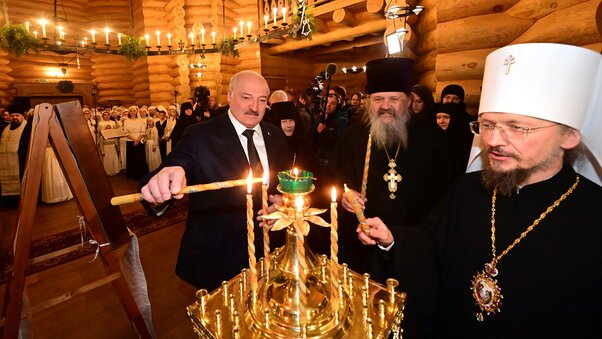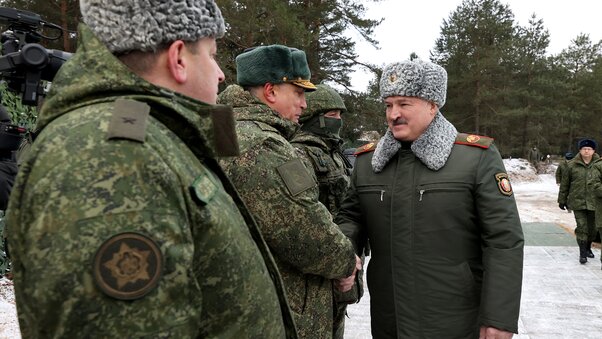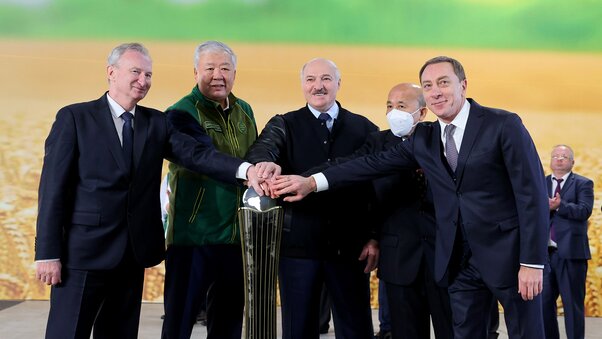Visit to science and technology exhibition Intellectual Belarus
- 30
- 13:19
Belarus has developed enough scientific and technical solutions not only for defense and security, but also for peaceful purposes, Belarusian President Aleksandr Lukashenko said as he visited the science and technology exhibition Intellectual Belarus in Minsk on 20 January.
“We once agreed with the head of the Academy that we should show what we can do,” the head of state recalled. Hundreds of developments are showcased at the exhibition, but this is far from all. Moreover, about half of new solutions has already been put into practice and sell well.
“People should see this exhibition. We have enough of everything not only for defense and security, but also for peaceful purposes,” the Belarusian leader said.
The head of state was particularly interested in developments in the field of artificial intelligence. He had discussed this topic earlier during his meetings with foreign partners, including partners from the United Arab Emirates, a country where artificial intelligence is one of key areas of focus. In this regard, Aleksandr Lukashenko recalled the Northern Waterfront project to build an experimental multifunctional complex in Minsk. “Why did I fall for this: not only because of the $5 billion in investments, but also because they promised me to create this smart city, as well as a powerful educational platform for artificial intelligence. There will be a university there. If you need support or contacts with these people (they have greatly advanced in this field), feel free to ask,” the head of state said.
As the President was informed, Belarusian artificial intelligence solutions are also in demand in the world, specialists from different countries learn from each other.
“You can count on me for whatever you need, including high-level contacts. I will support and help you if necessary,” the President said.
Aleksandr Lukashenko toured the booth displaying domestic computers made by Horizont. The company's equipment has already replaced a device of a well-known Western brand on the President's desk.
“Well done. You have showed that we can do everything. And no matter how difficult it was, we did it,” the Belarusian leader emphasized.
According to him, the West has already come to realize that it is necessary to stop fooling around and to resume cooperation with Belarus.
Speaking about the level of localization of these computers Aleksandr Lukashenko said: “Great job so far. Yet, the figure should reach 70% by the end of the year.”
The President was also updated on new solutions in microelectronics. This is the area where Belarus is actively cooperating with Russia within the framework of the Union State.
The President emphasized the importance of developing artificial intelligence and a special role of microelectronics. “If we want to be an advanced and civilized nation, this is what we should focus on in the future. There can be no artificial intelligence without you,” Aleksandr Lukashenko said.
The President was also informed in detail about a number of other developments - laser technologies, innovative batteries, electric transport, space, medicine, defense and security. In this regard, unmanned aerial vehicles deserve a separate mention, as they are intended not only for military needs, but also, for example, for agriculture. They are used in field preparation before applying plant protection products.
The expo features a number of developments in the field of medicine. They include prosthetics materials, cancer drugs. Currently, pre-clinical trials of an artificial heart valve of domestic design are underway. This is a completely import-substituting product that is on par with similar foreign developments.
The head of state traditionally pays a lot of attention to the agricultural sector. Given that food security has taken on new significance in the world, the developments of Belarusian agricultural scientists are especially relevant. They are also widely represented at the exhibition.
A separate section of the exhibition is dedicated to developments of young scientists. Currently, young scientists account for about 20% of all researchers in Belarus.
Before leaving the exhibition, Aleksandr Lukashenko received a book on the history of the Belarusian statehood. This book was introduced into university curriculum on 1 September.


